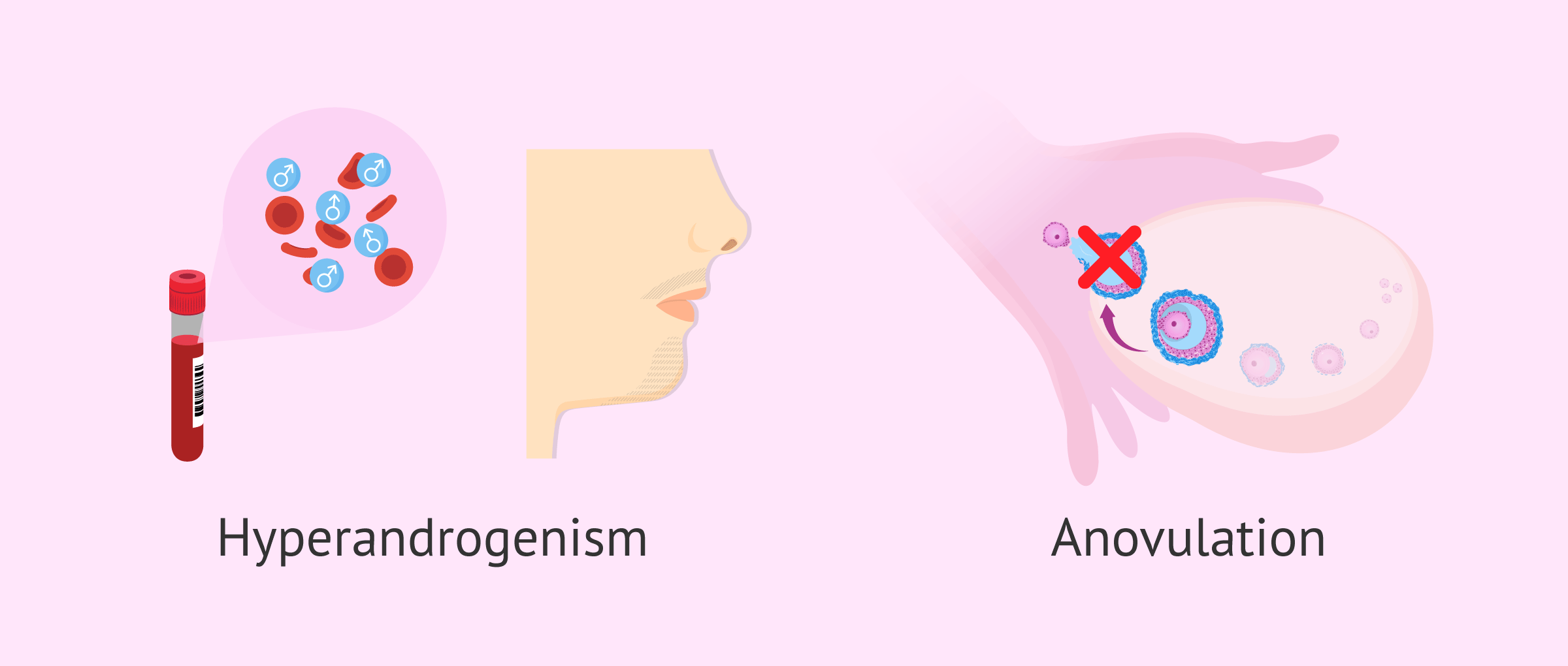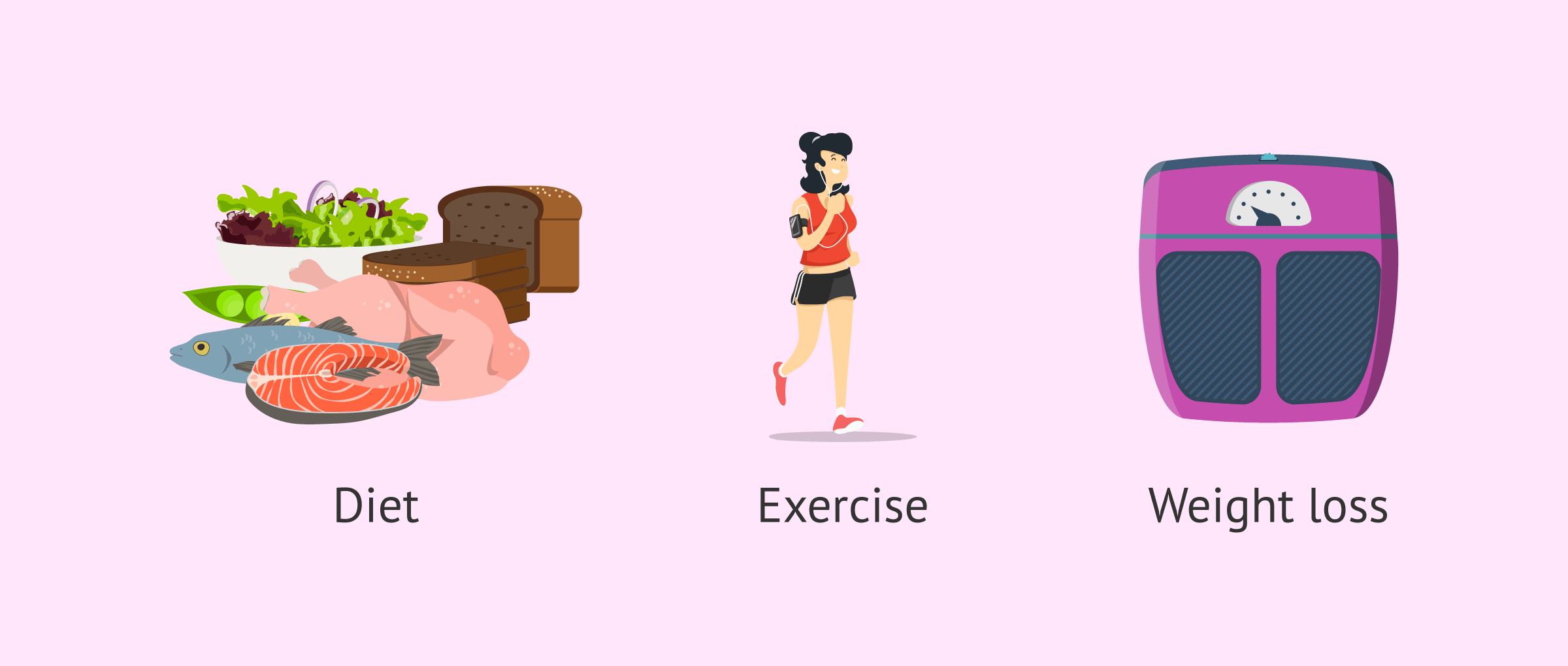Polycystic ovary syndrome (PCOS) is a hormonal disorder that can affect ovarian function and, therefore, female fertility. In addition, PCOS is relatively common, affecting 5-15% of women of reproductive age.
Patients with PCOS usually present hyperandrogenism (elevated androgen levels), as well as oligoovulation or anovulation (ovulation disturbances). However, there are certain natural remedies that can improve some PCOS symptoms. Among them, the most important is lifestyle care, especially if you are overweight or obese.
Provided below is an index with the 6 points we are going to expand on in this article.
- 1.
- 1.1.
- 2.
- 2.1.
- 2.2.
- 2.3.
- 2.4.
- 2.5.
- 2.6.
- 3.
- 3.1.
- 3.2.
- 4.
- 5.
- 6.
What is PCOS?
Polycystic ovary syndrome (PCOS) is an endocrine disorder associated with various metabolic, reproductive and even psychological manifestations.
Obesity is often related to PCOS, as well as insulin resistance. This condition means that insulin is not working effectively and the body produces more to compensate for this situation, leading to hyperinsulinemia (elevated insulin levels). It also increases hyperandrogenism (increased androgen levels), which alters the ovarian cycle and hinders or prevents ovulation.
You can continue reading more information about PCOS in the following link: Polycystic ovary syndrome (PCOS): causes, symptoms and treatment.
Androgens in PCOS
Androgens are colloquially called male hormones. The truth is that, although androgens are typical of men since they provide them with their secondary sexual characteristics, women also have androgens.
For women with PCOS, androgen levels are usually higher. This can lead, as we have mentioned, to alterations in ovulation.
If a woman with PCOS wants to have a child, she needs to see a fertility specialist to check her hormone levels. In this way, the patient can be helped to ovulate in order to search for gestation.
Natural remedies for PCOS
There are some natural remedies that may improve certain features of PCOS. However, the efficacy of most of them is not clearly demonstrated and it is of vital importance to consult a specialist before taking any type of natural preparation as a treatment for PCOS.
Healthy lifestyle
In patients with PCOS who are overweight or obese, when the BMI (Body Mass Index) is greater than 28, it is essential to lead a healthy lifestyle. There is no better natural treatment for PCOS, as it can be done through diet and exercise, than losing weight.
Weight loss can help restore ovarian function. However, reducing weight would also lead to an improvement in the metabolic and psychological manifestations of PCOS.
The most advisable is to reduce caloric intake, provided that the diet provides an adequate supply of nutrients, is balanced and varied with healthy foods. Moderate and frequent exercise can begin by simply walking for half an hour a day.
Finally, it is important to say that for weight reduction the patient can resort to the help of drugs or even surgery.
Chinese herbal medicine
Some patients opt for Chinese herbal medicine, but there is currently insufficient evidence to support its use in infertile PCOS patients. There are no clear results on whether Chinese herbal medicine improves gestation rate. In addition, there is little data on the adverse effects and safety of this type of medicine.
Therefore, further studies on these treatments and their effect on PCOS are needed.
Cimicifuga racemosa
Another alternative is Cimicifuga racemosaor black cohosh. It is a natural herbal remedy to improve certain symptoms of menopause such as hot flashes.
However, black cohosh has shown that its administration together with clomiphene citrate in timed coitus cycles of PCOS patients improved gestation rates over patients receiving clomiphene citrate alone. In addition, it has also been shown that black cohosh could improve hormone levels in PCOS patients. However, more research is needed on its dosage and effect, as well as comparing black cohosh with other possible treatments.
On the other hand, black cohosh extract should not be taken if you suffer from any liver disease or alteration. In addition, it is important to discontinue administration and consult a specialist if symptoms such as tiredness, brightly colored urine or jaundice (yellow skin and whites of the eyes) are observed.
Cinnamon
Cinnamon supplements (1.5 g/d) could also improve the cyclicity of menstrual cycles and could be an effective option for PCOS patients.
However, as in the previous cases, these are preliminary data that require further confirmation.
Vitex agnus-castus
The Vitex agnus-castusor chasteberry is a species found in the Mediterranean area and is used to alleviate premenstrual syndrome.
Despite this, it is used in alternative medicines and could improve menstrual cyclicity and, therefore, oligoamenorrhea or amenorrhea. It is important to mention that this extract should not be taken in case of pituitary tumors or breast cancer.
Acupuncture.
Acupuncture, and specifically electro-acupuncture in which needles are electrically stimulated, may also be effective in treating hyperandrogenism and oligoamenorrhea or amenorrhea in women with PCOS.
Despite this, there is currently no clear evidence on the effectiveness of acupuncture for the treatment of infertility in patients with PCOS.
FAQs from users
What foods are best for polycystic ovary syndrome?
Foods suitable for a correct diet with polycystic ovary syndrome (PCOS) are vegetables and green leafy vegetables, fruits, whole grains, legumes, oily fish and olive oil.
On the other hand, as in other types of healthy diets, processed foods, sugar and toxic habits such as alcohol should be avoided.
Are there any home remedies for PCOS?
One of the best approaches we can do at home for PCOS is to lose weight, in the case of being overweight or obese. In order to do so, it will be essential to follow a proper diet and to practice sports frequently.
On the other hand, there is not enough evidence regarding the beneficial effect of natural herbal treatments for PCOS.
Suggested for you
If you are interested in learning about other types of medical treatments for PCOS, we recommend you visit this link: Polycystic ovary syndrome (PCOS) treatment.
If, on the other hand, you would like to learn more about foods that promote female fertility, you can read the following article: What are the types of foods that promote female fertility?
We make a great effort to provide you with the highest quality information.
🙏 Please share this article if you liked it. 💜💜 You help us continue!
References
Arentz S, Abbott JA, Smith CA, Bensoussan A. Herbal medicine for the management of polycystic ovary syndrome (PCOS) and associated oligo/amenorrhoea and hyperandrogenism; a review of the laboratory evidence for effects with corroborative clinical findings. BMC Complement Altern Med. 2014 Dec 18;14:511.
Arentz S, Smith CA, Abbott J, Bensoussan A. Nutritional supplements and herbal medicines for women with polycystic ovary syndrome; a systematic review and meta-analysis. BMC Complement Altern Med. 2017 Nov 25;17(1):500.
Cunha A, Póvoa AM. Infertility management in women with polycystic ovary syndrome: a review. Porto Biomed J. 2021 Jan 26;6(1):e116.
Jedel E, Labrie F, Odén A, Holm G, Nilsson L, Janson PO, Lind AK, Ohlsson C, Stener-Victorin E. Impact of electro-acupuncture and physical exercise on hyperandrogenism and oligo/amenorrhea in women with polycystic ovary syndrome: a randomized controlled trial. Am J Physiol Endocrinol Metab. 2011 Jan;300(1):E37-45.
Kamel HH. Role of phyto-oestrogens in ovulation induction in women with polycystic ovarian syndrome. Eur J Obstet Gynecol Reprod Biol. 2013 May;168(1):60-3.
Kort DH, Lobo RA. Preliminary evidence that cinnamon improves menstrual cyclicity in women with polycystic ovary syndrome: a randomized controlled trial. Am J Obstet Gynecol. 2014 Nov;211(5):487.e1-6.
Lim CED, Ng RWC, Cheng NCL, Zhang GS, Chen H. Acupuncture for polycystic ovarian syndrome. Cochrane Database Syst Rev. 2019 Jul 2;7(7):CD007689.
Moini Jazani A, Nasimi Doost Azgomi H, Nasimi Doost Azgomi A, Nasimi Doost Azgomi R. A comprehensive review of clinical studies with herbal medicine on polycystic ovary syndrome (PCOS). Daru. 2019 Dec;27(2):863-877.
Moran LJ, Ko H, Misso M, Marsh K, Noakes M, Talbot M, Frearson M, Thondan M, Stepto N, Teede HJ. Dietary composition in the treatment of polycystic ovary syndrome: a systematic review to inform evidence-based guidelines. J Acad Nutr Diet. 2013 Apr;113(4):520-45.
Raja-Khan N, Stener-Victorin E, Wu X, Legro RS. The physiological basis of complementary and alternative medicines for polycystic ovary syndrome. Am J Physiol Endocrinol Metab. 2011 Jul;301(1):E1-E10.
Salama AA, Amine EK, Salem HA, Abd El Fattah NK. Anti-Inflammatory Dietary Combo in Overweight and Obese Women with Polycystic Ovary Syndrome. N Am J Med Sci. 2015 Jul;7(7):310-6.
Shahin AY, Mohammed SA. Adding the phytoestrogen Cimicifugae Racemosae to clomiphene induction cycles with timed intercourse in polycystic ovary syndrome improves cycle outcomes and pregnancy rates - a randomized trial. Gynecol Endocrinol. 2014 Jul;30(7):505-10.
Stener-Victorin E. Acupuncture for Infertility in Women with Polycystic Ovary Syndrome: What Does It Add? Semin Reprod Med. 2017 Jul;35(4):353-358.
Zhou K, Zhang J, Xu L, Lim CED. Chinese herbal medicine for subfertile women with polycystic ovarian syndrome. Cochrane Database Syst Rev. 2021 Jun 4;6(6):CD007535.
FAQs from users: 'What foods are best for polycystic ovary syndrome?' and 'Are there any home remedies for PCOS?'.




